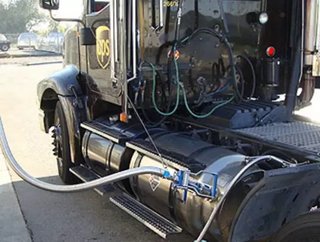UPS ditches gas guzzlers, opts for natural gas (LNG) trucks instead

United Parcel Service will add 48 heavy-duty trucks powered by liquefied natural gas (LNG) to its UPS Ground operation on the West Coast of the U.S., according to a release. Paid partially from grant money from the U.S. Department of Energy’s budget, the plan will bring the total alternative fuel fleet at UPS to 1,914 vehicles, with over 1,000 fueled by natural gas.
“Investment in a fuel-efficient technology that helps reduce our carbon footprint and reduce our dependence on petroleum remains a key component of UPS's transport strategy,” said Mike Britt, director of vehicle engineering at UPS in a release. “For our heavy-duty vehicles, LNG has proved successful in reducing emissions, keeping our maintenance and operating costs low and significantly reducing our dependence on petroleum for these shipping lanes.”
Check out the most popular content on the WDM Network today
- How the Environmental Shipping Index will clean up Europe’s Ports
- Ten Places You Shouldn’t Park the Company Truck
- Top Ten Outsourcing Companies in the World
The 450-horsepowered trucks will cut diesel use by 95 percent and also emit 25 percent fewer greenhouse gasses. UPS will deploy the natural gas trucks between a 229-mile strip of desert between Las Vegas, Nev., and Ontario, Calif. The LNG trucks can make it roundtrip between Ontario and Vegas on a single tank of fuel. Ontario is also 37 miles from the Port of Los Angeles, which is the busiest port in the U.S. and 8th busiest port in the world.
Whether its UPS Ground going green with electric trucks in London for the 2012 Olympics, or UPS Logistics using sustainability platforms to gain a competitive edge, the entire UPS global team is dedicated to a future that includes clean technologies and green initiatives. UPS is on the cutting-edge of sustainability and we even had to ask the question, “Is UPS’s carbon neutral shipping option the answer?” in the February edition of Supply Chain Digital.
UPS is a remarkably efficient operation, which is an characterisitc that’s absolutely necessary in the uber-competitive shipping and logistics industry. With each carefully-planned move it makes, The Big Brown Machine reaffirms where its priorities are for the future: alternative fuel transportation and protecting the environment.
To learn more about the operational efficiency deployed at UPS, check out this National Geographic video breaking down every function, process and intricacy of the UPS super hub “Worldport” in Louisville, Kentucky.






